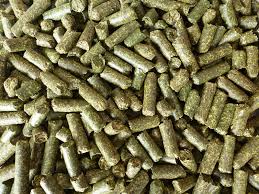By
feeding pelleted feed, the animal is more apt to receive a totally mixed ration. How water perform on pellet production line ? The moisture in feed mash affects pellet quality and production rates. Moisture in feed mash comes from two sources: bound moisture present in the feed ingredients and added moisture from water and steam addition. In general, grinder performs well with common grains including corn, grain sorghum, or wheat depending on their moisture content. Excessive moisture in hammer mill ground grain can result in high heat due to friction and, because of the heat, moisture will be lost. Evaporation of moisture and fine powder formed paste which would cause screen hole blocked , as well as reduce the mill's discharge capacity. Ingredient moisture content has always been a random variable. Usually the water content of raw materials such as grain, corn are controlled under 14%.

Grinding results in moisture losses between 0.5 and 1% in the final feed compared to the raw materials. An interesting way to compensate such losses is by adding water during the mixing process. Adding water into the mixer before steam conditioning improved pelleting efficiency and pellet quality. So, how to control the moisture content of feed mixer requirements?
1.Strictly test moisture of each single raw material
2.Take sample inspection for processing feed, setting out the mixed ingredients initial moisture content.
3.According to the proportion of water, calculate the theoretical mixed value, and then determine whether to add water to satisfy feed actual moisture requirements.
When processing material moisture is too low, feed pellets surface appears smooth and hard, not easy for animal digestion and absorption. Conversely, the processing feed appearance is coarse in low forming rate. which can cause mildew and broken during transport. Thus, properly moisture control is important as it reduces the energy usage during the pelleting process, and it ensures that production runs more smoothly by lowering the risk of blockages. This is important for preventing nutrient losses as a result of excessive heat production.
 EN
EN
 Release Lime: 2016-05-27
Release Lime: 2016-05-27
 Source: Longer - Nut Processing Solution Provider
Source: Longer - Nut Processing Solution Provider
